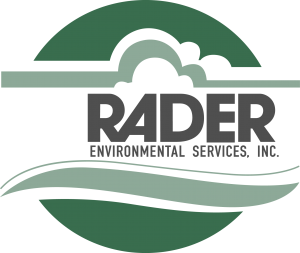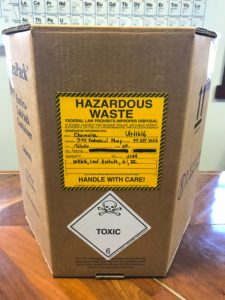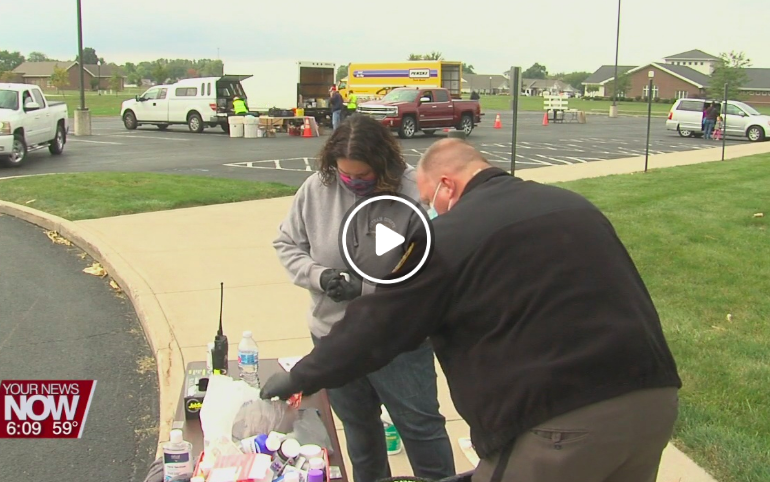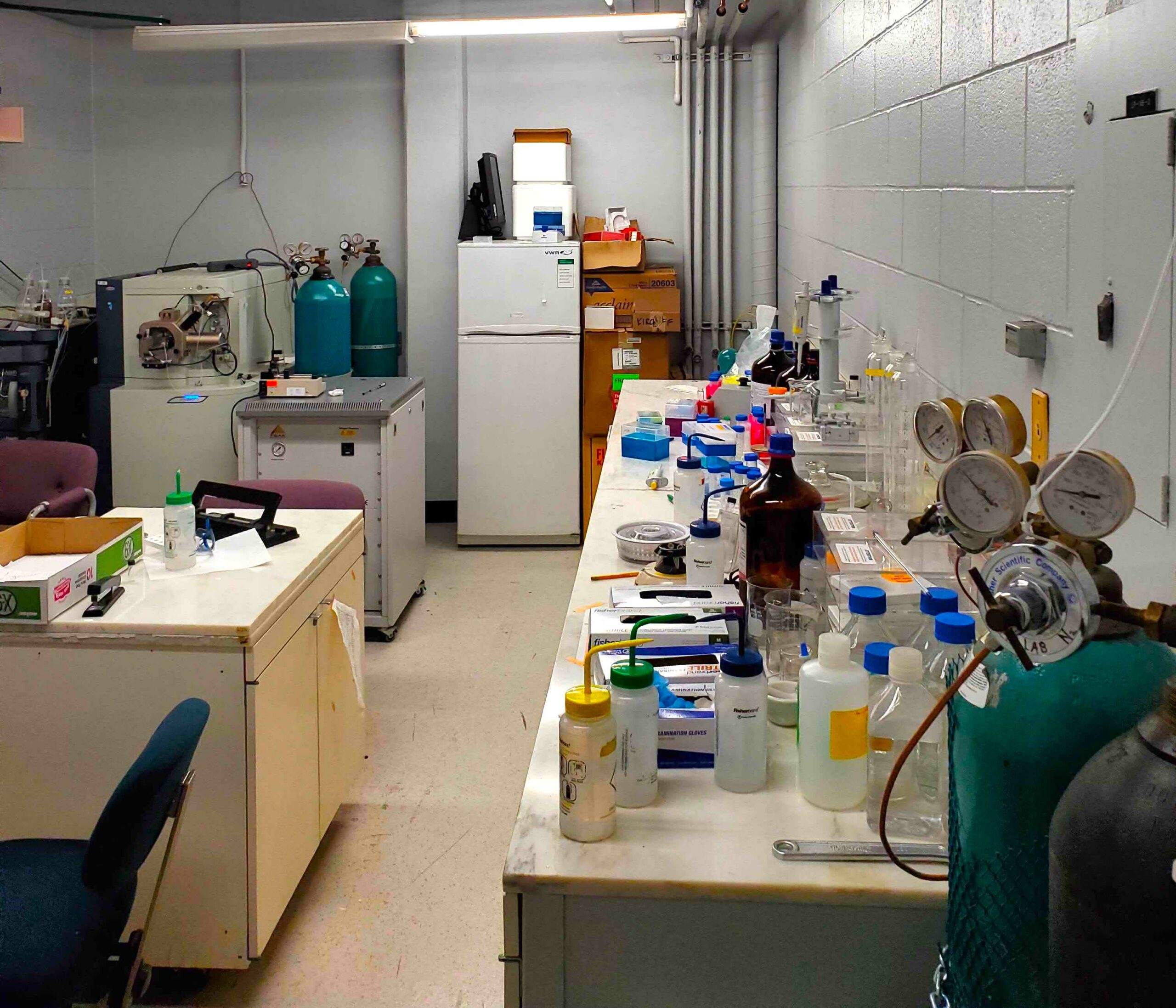One of the main responsibilities of every school system is to protect their students, faculty and support staff. They protect students from injuries in the gymnasium, the parking lot, the hallway – anywhere the school district owns property.
While some risks on school grounds are easily identified, others aren’t so easy to identify. Some schools fail to see the risks associated with having chemicals in a classroom, maintenance facility or other building. Others may understand the risks, but a budget shortfall or de-prioritization may prevent them from taking action. But, they should apply the same risk-mitigation strategies to managing chemicals at school as they do to preventing student injuries in the gymnasium.
Uncovering Environmental Risks at Your School
At any point in time, just about any chemical could be on your school grounds without your knowledge. At one Ohio high school, Rader recently found bromine, a highly-corrosive liquid that’s an acute inhalation hazard stored under the gym’s risers!
Diesel fuel may be sitting in your maintenance garage, stored in containers not approved by the Environmental Protection Agency or Department of Transportation (DOT) – two federal agencies that oversee hazardous waste management and transportation.
Make sure your school doesn’t have elemental mercury or mercury-containing devices on school grounds. Also, make sure the chemicals you have aren’t a domestic terrorist threat. Some chemicals used by universities or R&D facilities have certain reporting requirements managed by the Department of Homeland Security. These substances could do major damage if they get into the wrong hands.

Dangerous chemicals may even be accessible to students. Or, perhaps you are managing chemicals at school in your stockroom that should be kept in a flammable liquid storage cabinet by law.
A safety data sheet (SDS) should be on file for every chemical in your school to protect teachers and students.
Every school should be fully aware of the risks each chemical presents to the environment, its students and its faculty.
Conduct a Districtwide Risk Assessment
A risk assessment is a thorough examination of your environment to identify situations, substances, processes, etc., that may cause harm. An effective risk assessment for managing chemicals at school protects health and life, ensures compliance with local, state and federal laws, and takes into account best practices.
After conducting a risk assessment, your school should evaluate how likely – and how severe – the risk is. Then, determine which measures should be in place to eliminate or control the harm.
Many schools have management plans and procedures in place but how frequently are they updated? As a best practice, we recommend conducting an annual examination of your environmental liabilities once a year, or hire an environmental consultant to conduct the audit.
Create a Chemical Management Plan at Your School
When developing an effective chemical risk assessment plan, start by taking a complete inventory of your school’s chemicals. Ultimately, your school board is responsible for knowing exactly which chemicals are on their property.
A sound chemical management plan also looks good to your district’s insurance provider and has strong public relations value. Parents of your students will likely rest easier knowing that dangerous or toxic chemicals are properly managed.
Tips for Effective Chemical Management
One sound piece of advice: Make sure you don’t possess a substance that is beyond your knowledge as a user. If you don’t understand how that chemical is used in the lab, how it affects one’s lungs when inhaled, or how it reacts to water or to air, you probably shouldn’t own it. The key to properly managing chemicals at school is proper control.
Know which members of your staff have access to these chemicals or substances. Are these staff members trained in using these chemicals? Ensure that they’re properly secured and stored away from students or other faculty members who may not know how to handle them.
Here are some tips for creating an effective plan for managing chemicals at school:
- For science teachers: Analyze the risk associated with managing each chemical in your classroom. Keep in mind that some of the properties in these chemicals can exhibit both acute and chronic hazards.
- For facilities managers: Analyze the risk associated with managing each chemical, including paint, pool-treatment chemicals, fertilizers, gasoline, diesel fuel, etc.
- Don’t stockpile chemicals simply because they were free or you inherited them from another department, retired teacher or a private company. Instead of educating students, these chemicals are more likely to take up storage space or create environmental hazards. If you’re not sure when to dispose of certain chemicals in your classroom, consult with a third-party chemical waste manager.
- If you have too much of any one chemical on hand, make a plan to properly remove and dispose of it.
- Always be cognizant of how a spill would impact your school and its environment.
- If there is a spill at your school, make sure you have specialists on hand or immediate access to specialists who know how to handle it.
Segregating Laboratory Chemicals
Different schools utilize different storage-segregation schemes for chemical stockrooms. Science teachers should identify which schemes they prefer, and then segregate their chemicals accordingly.
Segregating and maintaining proper inventory are the most critical steps a school can take when it comes to effective chemical management.
How to Dispose of Chemical Waste
Before the passage of the Resource Conservation and Recovery Act (RCRA), the set of EPA laws governing proper management of hazardous and non-hazardous solid waste, many schools may have disposed of chemicals down the drain or in the local county landfill.
Some chemicals at your school can still be poured down the drain, while others cannot. Some chemicals can be neutralized with sodium hydroxide, for instance, and poured down the drain when the chemical’s proper pH is achieved. However, we recommend that an expert in hazardous waste management helps you make those decisions.
However, if your school decides to neutralize chemicals in large quantities, make sure you have notified and are in compliance with your local wastewater treatment facility. Another consideration when dumping chemicals into the watershed is your location. The chemicals may impact a rural area’s septic system differently than a municipality’s sewer system.
Off-Site Disposal Requires Proper Shipping
The generator is responsible for determining whether it has hazardous waste on its premises or not. It can be a daunting task to make this determination, so you might want to hire an outside firm for guidance. A third-party company can also save you money by recycling chemicals, neutralizing them so they don’t have to be incinerated, or help you avoid a citation by the EPA.
If your school determines that it has chemical waste, consult with an expert hazardous waste management company to help you determine how it should be handled. In addition, the DOT requires that every chemical shipped as waste off-site has proper packaging, is correctly manifested and is compliant with the DOT.
How to Purchase and Order Chemicals
While it may be easy to manage and order office supplies, managing and ordering chemicals is a whole different ball game. They both have risk levels, but both activities clearly present two different levels of risk to your students, faculty and support staff.
Whether ordering chemicals for experiments students are conducting or fuel for your district’s buses, are you purchasing the right substances? For instance, your lawn care/facilities department may frequently purchase harsh chemicals or fertilizers for lawn management and care. But it might be possible to source a sustainable or environmentally friendly substance, or one with non-hazardous properties, for instance.
One way to know if you’re investing in the correct chemical is to trust an expert with nearly four decades of experience to advise your school.
Leave It to the Experts: Managing Chemicals at School

Teachers are paid to teach students to learn, not to manage environmental health and safety (EHS) concerns. Rader can handle all aspects of chemical management for your school district, including taking inventory, making recommendations for chemical purchases based on your current and future curriculum, and saving you money when purchasing chemicals.
How often do you need to do this? We recommend doing a “clean sweep” every year to cut costs and mitigate risk.
Side view portrait of two workers wearing biohazard suits working at waste processing plant sorting recyclable plastic on conveyor belt










